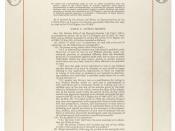Title VII and it Impact in the Workplace
Title VII of the Civil Rights Act plays a pivotal role in defining the employment practices found in today's work environment. The law enacted in 1964 prohibits employment discrimination based on race, color, religion, gender, or national origin. Since its inception, Title VII has sparked an increase in anti-discrimination laws designed to "promote fairness, equality, and opportunity within the workplace" (Bennett-Alexander & Hartman, 2003, p. 5). With the 40th anniversary of this single most important piece of legislation upon us, we will take this opportunity to reflect on the history and evolution of Title VII, examine its impact in the workplace, identify those covered under the act, and finally recommend policies and procedures organization's should have in place to minimize claims of discrimination.
History and Evolution
The Civil Rights Act of 1964 was passed soon after the milestone March on Washington. In the largest march ever held in the United States, people of all races and colors gathered together to show legislature that racism would no longer be acceptable in society.
Title VII, the section that deals with discrimination in the workforce is one small part of the larger piece of legislation. Title VII, of the Civil Rights Act, quickly became the most important arbiter of rights under the new law (Bennett-Alexander & Hartman, 2001). The workforce has drastically changed since the passage of the act. Women and minorities are engaged in employment now more than ever. With the passage of Title VII, the door was opened to prohibiting job discrimination and creating fairness in employment (Bennett-Alexander & Hartman, 2001). Soon after, protection against discrimination based on age and disability was provided.
Title VII was amended several times after 1964. Congress passed the Age Discrimination in Employment Act of 1967 (ADEA) protecting...



comment
it is a comprehensive paper and cover all the aspect of title II
0 out of 0 people found this comment useful.